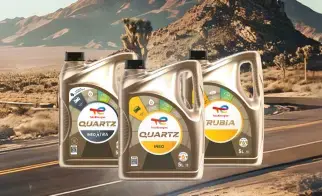What's the difference between 5w30 and 5w40 car engine oil?
The specific car oil you should use in your vehicle will be noted in the owner’s handbook or can be found using tools such as TotalEnergies Lub Advisor. Some of the most commonly recommended grades for car are 5w30 and 5w40 engine oils. These are ideal for starting engines at low temperatures and are effective at high engine temperatures, meaning they can be used in most conditions, but how do they differ, and which should you use? In this guide, we explore these two grades of car engine oil, what they’re good for, and why vehicle manufacturers note you should use one instead of the other.
What does 5w40 and 5w30 mean?
For each grade of engine oil, the ‘w’ stands for ‘winter’, as per the Society of Automotive Engineers (SAE) multigrading system. The number preceding the ‘w’ indicates the oil’s viscosity (or thickness) at low temperatures, and the number after it indicates viscosity at higher temperatures (100°C for kinematic viscosity, and 150°C for dynamic viscosity), when the engine is running.
An oil's viscosity is its resistance to flow. Oil that’s too thick won’t flow properly through your engine, while oil that’s too thin won’t protect moving parts from wear and tear. Viscosity increases as the temperature drops and decreases as the temperature rises.
When selecting a grade of motor oil, you face a trade-off between performance and protection. An oil that’s more viscous while your engine is running will do a better job of protecting engine components but might be too thick to effectively safeguard engine performance. That’s why it’s important to consult your engine manufacturer about exactly which grade of oil is appropriate – engines are built differently, making the wrong oil is likely to be the wrong fit for your model.
The differences between 5w30 and 5w40 engine oils
For 5w30 oil:
- Kinematic viscosity is between 9.3-12.5mm²/s
- Dynamic viscosity is 2.9mPas.
For 5w40 oil:
- Kinematic viscosity is between 12.5-16.3mm²/s
- Dynamic viscosity is 3.5mPas.
In practice, this means that each oil is just as viscous at lower temperatures and will remain viscous at -30°C, however 5w40 oil outperforms 5w30 oils at higher temperatures, being effective up to ambient temperatures of 50°C, as opposed to 30°C.
5w40 and 5w30 motor oils have winter viscosity grades of five, meaning they are effective down to temperatures of -30°C, and are more viscous at very low temperatures, compared to, say, 10w40 oils.
Resultantly, 5w40 oils are likely to be used in higher-performance engines that have higher operating temperatures and loads than the norm – those driven in urban environments, that commonly sit in traffic or driven at particularly high speeds, for example.
If your vehicle is not designed to be driven in a high-performance manner, or you drive at a more considered, environmentally friendly pace, 5w30 oils are a good choice. These are commonly better for certain engine components such as oil pumps, can clean the engine better, and have longer lifespans due to having a lower temperature range.
What about 5w40 or 10w40 engine oil?
The choice between 5w40 motor oil and an alternative like 10w40 depends on the winter temperature in your region. 5w40 is better for starting your engine at low temperatures as it flows more easily in this environment. When the engine is running and hot, the differences are negligible; 5w40 and 10w40 both have high viscosities and are equally effective in protecting against engine wear.
Always consult your owner’s manual when choosing an engine oil.
Find the right oil with Lub Advisor
You might also be interested in

Find the right oil for my car

Buy our engine oils

How to guides
